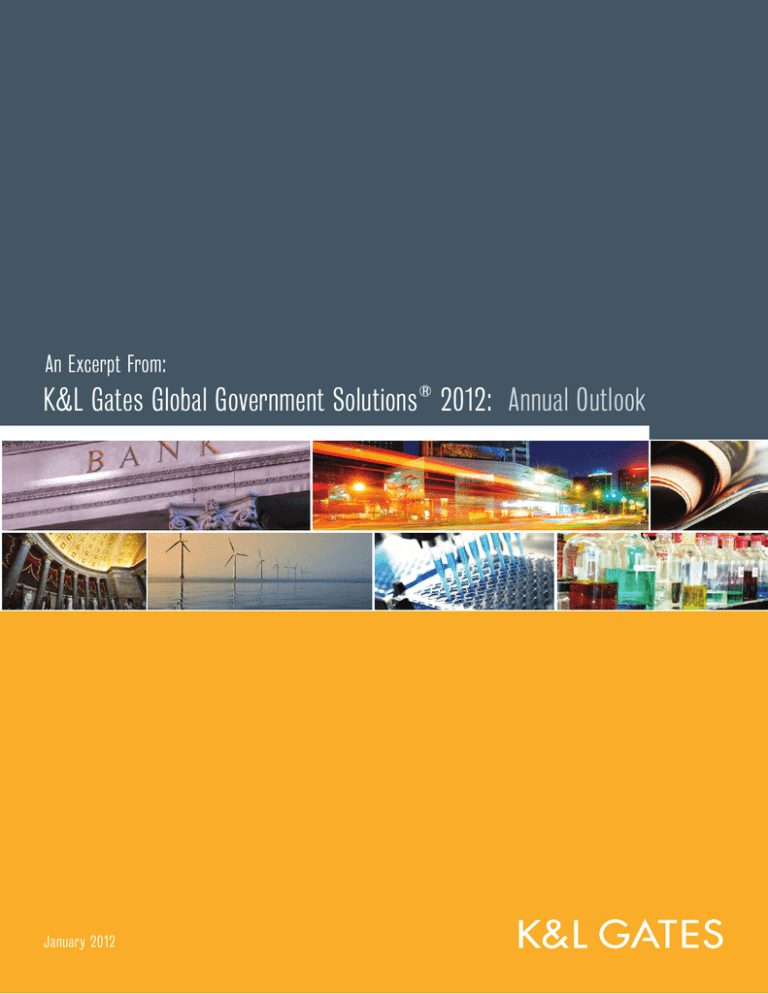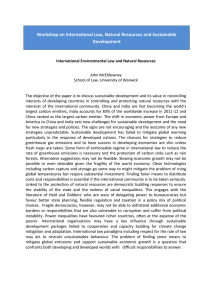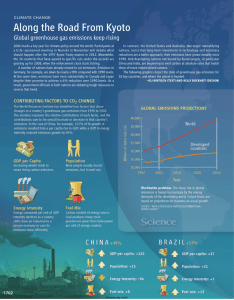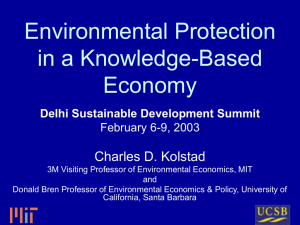
An Excerpt From:
K&L Gates Global Government Solutions ® 2012: Annual Outlook
January 2012
Asia
Developments and Issues in Asia Climate Policy and Law
In many ways, it is business as usual around Asia in relation to national and
international efforts to advance climate change policy and law.
Following the international climate
negotiations held in Durban from November
28 to December 11, 2011, and fortified
by an international agreement that included
the establishment of a second commitment
period to the Kyoto Protocol (legally binding
emissions reductions for the period 2013
to 2017 or 2020) and the launch of
the Green Climate Fund, governments in
Asia are pressing ahead with domestic
climate mitigation and adaptation action.
Nevertheless, difficult global economic
conditions have affected the ability and will
of governments to take bold action, and
there has been a wide disparity in the level
and type of commitments and action put
forward by countries in Asia.
Also weighing on the minds of developing
country, non-Annex I Parties of the Kyoto
Protocol in Asia is the position of the
European Commission on the status
and eligibility of Clean Development
Mechanism (CDM) projects and Certified
Emissions Reductions (CERs) generated by
those projects hosted in their countries. A
key concern of Asian non-Annex I Parties
(and indeed of those in other parts of the
world) is the apparent restriction in the use
of CERs from CDM projects registered after
January 1, 2013 for compliance in the
European Union Emissions Trading Scheme
(EU ETS) under the amended Directive
2003/87/EC (Amended Directive),
except for CDM projects registered
after that date hosted in least developed
countries (LDCs). While the Amended
Directive provides for the possibility of using
CERs from CDM projects hosted in non-LDC
countries registered after January 1, 2013
where the host country has concluded
bilateral or multilateral agreements with
the EU, no such agreements have been
concluded to date.
54
Another controversial issue in Asia relates to
the extension of the EU ETS to the aviation
sector, which has provoked heated protests
from non-EU carriers, including Asian
airlines that fly into and out of the EU.
Asian governments, many of whom wholly
or partly own their national carriers, have
started to take more vocal positions on the
implementation of the EU ETS to aviation.
In a decision dated December 21, 2011,
the European Court of Justice rejected the
challenge of the Air Transport Association of
America and a number of U.S. airlines on
the basis that the inclusion of international
aviation in the EU ETS is contrary to
international law and to the Chicago
Convention, the Kyoto Protocol, and the
Open Skies Agreement. This decision
effectively limits if not ends further EU legal
challenges, increasing the prospect of
retaliatory trade measures by disaffected
countries and WTO legal challenges.
Beyond international climate
negotiations, Asian countries have been
working at different paces in establishing
and advancing their domestic climate
change strategies, plans, and agendas.
Comments on selected Asian countries
are set out below.
Cambodia
Climate vulnerability threatens Cambodia,
as it does many LDCs. Cambodia is
implementing a pilot project within the
framework of reducing emissions from
deforestation and forest degradation as
its Nationally Appropriate Mitigation
Action (NAMA). The country is one of the
Asian LDCs most likely to benefit from the
implementation of new CDM projects after
2012 by virtue of the Amended Directive.
K&L Gates Global Government Solutions ® 2012 Annual Outlook
China and Hong Kong
The main driver of climate policy and action
in China and the Hong Kong Special
Administrative Region is the 12th National
Five Year Plan (12th FYP). The 12th FYP
aims to shift China to a low carbon
economy and sets a 17 percent carbon
intensity reduction target for the period
2011 to 2015. This is consistent with
China’s national carbon intensity reduction
target of 40 to 45 percent by the year
2020 (base year 2005), but effectively
leaves more aggressive action for the next
five-year plan.
The Hong Kong government has proposed
an even more aggressive carbon intensity
reduction target of 60 to 65 percent
by 2020 (adopting a 2005 base
year) but has yet to implement specific
actions following the closing of a public
consultation on climate change policy in
December 2010.
The Guangdong provincial and Hong
Kong governments recently indicated that
they are cooperating in the establishment
of a greenhouse gas pilot emissions trading
scheme (an earlier sulfur oxides, nitrogen
oxides, and particulates pilot emissions
trading scheme was unsuccessful), which is
one of six pilot emissions trading schemes
under development in China pursuant to
the 12th FYP. (The others are the cities of
Beijing, Chongqing, Shanghai, Tianjin,
and Hubei Province.) Guangdong
government officials have suggested that
the Guangdong-Hong Kong pilot scheme
would accept international carbon credits
for compliance. A climate change law is
also under development and is expected
to be promulgated during the 12th FYP
period. While a national carbon tax is
under consideration, it is not expected to be
implemented in the near future.
Asia
India
Japan
Singapore
The National Action Plan on Climate
Change of 2008 (Plan) remains the
blueprint of India’s policy and action on
addressing climate change mitigation and
adaptation. The Plan outlines eight core
national missions up to 2017, targeting
energy use, energy efficiency, renewable
energy, and building research capacity on
climate change issues. India has committed
to a voluntary emissions intensity reduction
target of 20 to 25 percent (2005 base
year), exclusive of agricultural emissions,
by 2020. India’s 12th Five Year Plan,
expected to be launched on April 1, 2012
will outline India’s low-carbon growth
strategy. India is not developing a domestic
emissions trading scheme or considering
the implementation of a carbon tax.
As the sole Asian Annex I Party, Japan
has pledged a target of 25 percent
emissions reduction by 2020 (1990 base
year), contingent on a fair and effective
international agreement. Efforts to enact this
25 percent emissions reduction target into
law, along with legislation to implement a
carbon tax and a cap and trade scheme
have not been successful to date. On
a brighter note, the Tokyo Metropolitan
Government continues to implement a
mandatory urban cap and trade scheme
(launched in 2010) to cover emissions
from 1,400 building installations. This
scheme targets greenhouse gas emissions
reductions of 25 percent by 2020 (2000
base year). Two compliance periods run
from 2010 to 2014 and 2015 to 2019.
Japan is not considering the implementation
of a carbon tax.
Singapore has pledged that the
implementation of its NAMAs will lead to
a reduction in greenhouse gas emissions
of by 7 to 11 or 16 percent below
business as usual by 2020. The latter
target is contingent on a legally binding
global agreement in which all countries
implement their commitments in good faith.
The Singapore government is currently
working on the National Climate Change
Strategy 2012, which will provide a
framework and overall strategy to tackle
climate change related issues. It is intended
to outline policies and measures to reduce
emissions, and to cope with the impacts of
climate change and build on the country’s
capabilities to tap opportunities arising from
climate change. Singapore is considering
the feasibility of a domestic emissions
trading scheme or the implementation of
a carbon tax but nothing concrete has
emerged to date.
Indonesia
On September 26, 2011, the president
of Indonesia signed Presidential
Decree No.#61 of 2011 (Decree)
on a National Action Plan to reduce
greenhouse gas emissions. The Decree
confirmed Indonesia’s voluntary emissions
reduction target of 26 percent or up to
41 percent with international support
by 2020. The National Action Plan
is intended to provide guidance to
Indonesian government ministries and
local governments. Local governments are
required to develop regional action plans.
Activities under the National Action Plan
are grouped under agriculture, forestry
and peat lands, energy and transport,
industry, and waste management.
Indonesia is not developing a domestic
emissions trading scheme or considering
the implementation of a carbon tax.
Taiwan
The legal status of Taiwan as an
independent state is controversial and has
made it difficult for Taiwan to participate
fully in international climate change
negotiations and action. Taiwan is not
a party to the United Nations Climate
Change Conference (UNFCCC) or the
Kyoto Protocol. However, Taiwan is newly
industrialized and has taken significant
steps domestically to reduce greenhouse
gas emissions. The country continues to
seek observer status in international climate
negotiations. Domestically, the Greenhouse
Gas Reduction Act is under review by
the Taiwanese legislature and on
April 18, 2011, the Environmental
Protection Administration issued the
Greenhouse Gas Reduction Credit
Accounting Management Guidelines to
facilitate domestic carbon offset projects.
Christopher Tung (Hong Kong)
christopher.tung@klgates.com
K&L Gates Global Government Solutions ® 2012 Annual Outlook
55
Anchorage Austin Beijing Berlin Boston Brussels Charleston Charlotte Chicago Dallas Doha Dubai Fort Worth Frankfurt Harrisburg
Hong Kong London Los Angeles Miami Moscow Newark New York Orange County Palo Alto Paris Pittsburgh Portland Raleigh
Research Triangle Park San Diego San Francisco São Paulo Seattle Shanghai Singapore Spokane Taipei Tokyo Warsaw Washington, D.C.
K&L Gates includes lawyers practicing out of 40 offices located in North America, Europe, Asia, South America,
and the Middle East, and represents numerous GLOBAL 500, FORTUNE 100, and FTSE 100 corporations, in
addition to growth and middle market companies, entrepreneurs, capital market participants and public sector
entities. For more information about K&L Gates or its locations and registrations, visit www.klgates.com.
This publication is for informational purposes and does not contain or convey legal advice. The information herein should not be used or relied upon in regard to
any particular facts or circumstances without first consulting a lawyer.
©2012 K&L Gates LLP. All Rights Reserved.







